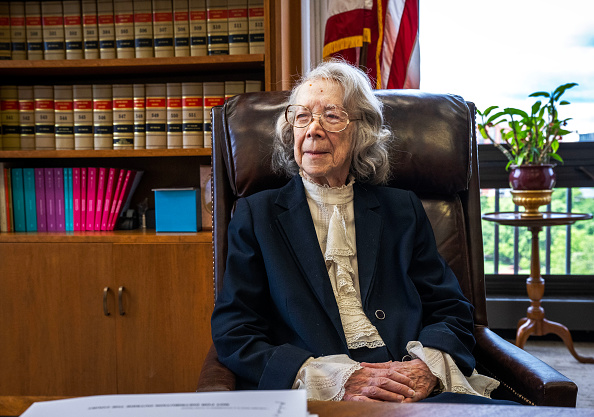Federal appeals judge, 97, who refused to cooperate in fitness probe loses challenge to disability law

Judge Pauline Newman of the U.S. Court of Appeals for the Federal Circuit in May 2023. A federal judge has upheld a disability law used to suspend Newman, now age 97, from hearing new cases while dismissing the remaining claims in her legal challenge. (Photo by Bill O’Leary/The Washington Post via Getty Images)
Updated: A federal judge has upheld a disability law used to suspend a 97-year-old federal appeals judge from hearing new cases while dismissing the remaining claims in her legal challenge.
U.S. District Judge Christopher R. Cooper of the District of Columbia ruled Tuesday against Judge Pauline Newman of the U.S. Court of Appeals for the Federal Circuit, Law360 reports.
Newman was suspended from hearing new cases in September 2023 for refusing to participate in medical evaluations to determine her mental fitness for the bench.
When suspending Newman, the Federal Circuit’s judicial council said an investigation “provided overwhelming evidence that Judge Newman may be experiencing significant mental problems, including memory loss, lack of comprehension, confusion and an inability to perform basic tasks.”
Newman’s federal lawsuit challenged the law that created circuit judicial councils, which can take action on complaints regarding judges’ physical and mental disabilities, and the Judicial Conduct and Disability Act, which governs the procedure in such cases.
Cooper previously dismissed most of the counts in Newman’s 11-count suit in February, citing a lack of jurisdiction and failure to state a claim on which relief can be granted.
In his new decision on the remaining counts, Cooper said the disability law does not violate the Fourth Amendment and is not unconstitutionally vague.
Newman had alleged that provisions that can compel medical and psychiatric evaluations violate the Fourth Amendment’s ban on unreasonable search and seizures.
Newman has not shown that the law is unconstitutional in all applications, the standard required in a facial challenge to the constitutionality of a law, Cooper said.
“Though some investigative conduct might trigger Fourth Amendment concerns, and even constitute violations of an individual’s privacy rights, Judge Newman has not shown that every application of the provision offends the Fourth Amendment,” Cooper said.
Cooper also said the law is not unconstitutionally vague because it applies only to judges who are aware of their duties.
“Indeed, before taking office, all judges must swear an oath to ‘faithfully and impartially discharge and perform all the duties incumbent upon’ them,” Cooper said. “Because the provision is pegged to ‘knowable criteria,’ it is not impermissibly vague.”
Newman is represented by the New Civil Liberties Alliance, a nonprofit public interest law firm, which provided a statement to the ABA Journal.
“NCLA will certainly appeal both yesterday’s decision and … February’s order,” said Greg Dolin, senior litigation counsel at the New Civil Liberties Alliance, in the statement. “We have always intended to pursue this matter, if necessary, all the way up the legal chain. In terms of yesterday’s decision, it is disappointing but not surprising. We were prepared for this outcome, and we will be filing a notice of appeal in short order.”
See also:
Investigations of federal judges are rare and should happen more, former clerk says
Updated July 10 at 11:47 a.m. to include the statement from Greg Dolin of the New Civil Liberties Alliance.



